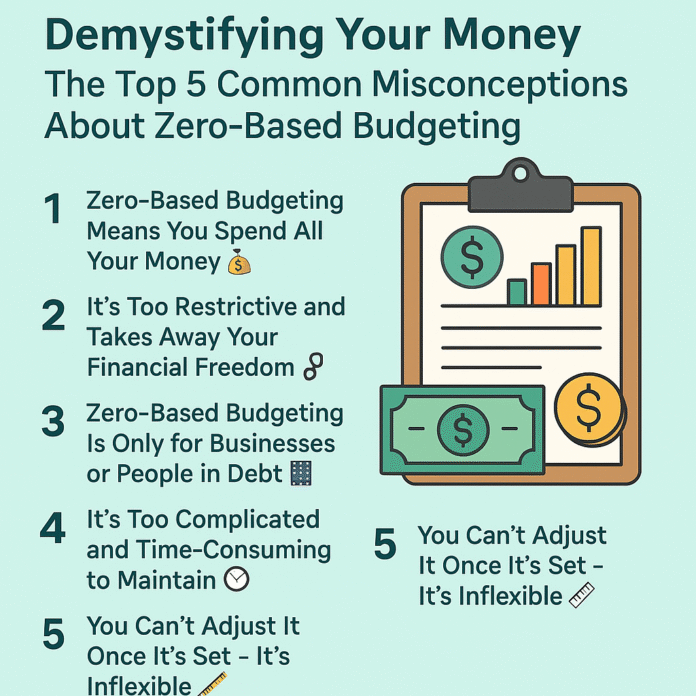I. Introduction
When you first heard of zero-based budgeting, did you think, “That sounds way too intense for my everyday life”? You might picture squeezing every last penny until you have nothing left—no extra cash, no treats, and definitely no wiggle room. Or maybe you’ve heard that it’s only for companies that count beans or people who are about to go bankrupt. If so, you’re not the only one. These are some of the most common myths about zero-based budgeting (ZBB).
The basic idea behind zero-based budgeting is simple: at the end of each budgeting period, your income minus your expenses should equal zero. That doesn’t mean you spend until you’re broke; it means you give every dollar a job, like paying rent, buying groceries, saving, paying off debt, investing, or having “fun money.” When you do ZBB right, you take control of your money on purpose, change how you think about spending, and speed up the progress of your financial goals.
But a lot of people never get to enjoy these benefits because they believe myths that make ZBB seem hard, limiting, or not needed. In this article, we’ll clear up the five biggest myths about zero-based budgeting, tell you the truth about each one, and give you real-world examples and step-by-step instructions so you can use it with confidence. This is a reader- and search-friendly resource because it has an SEO-optimized structure and best practices for EEAT throughout.
We’ll talk about the following:
- False belief 1: Zero-based budgeting means you spend all your money.
- Misunderstanding 2: ZBB is too strict and takes away freedom
- Misconception 3: ZBB Is Only for People Who Are in Debt or Businesses
- Myth 4: ZBB is too hard and takes too long
- Misconception 5: Once ZBB is set, you can’t change it.
- The Real Strength of ZBB
- Questions That Are Often Asked
- Conclusion and What to Do Next
II. The 5 Most Common Mistakes People Make About Zero-Based Budgeting
Misconception 1: Zero-Based Budgeting Means You Spend All Your Money 💸
A. Why This Myth Keeps Going
The word “zero” means a countdown: zero dollars left, zero cushion, and zero room for error. When you first hear about ZBB, it’s easy to think that “zero” means “spend everything.” Media images of budgets drawn in red ink only add to the idea that zero-based budgeting means never-ending austerity.
B. The Truth: Assignment, Not Depletion
In reality, zero is the end result of your allocation process. It’s about making sure that every dollar has a job. You can break down your income into categories like rent, utilities, groceries, an emergency fund, retirement contributions, fun money, and so on. The total of all these categories is your total income, which leaves you with a “net zero” balance. But every dollar has a job.
- Saving money as an “expense”: Putting money into an emergency fund is just like any other line item.
- Paying off debt: Extra payments on credit cards don’t go into a “miscellaneous” bucket; they go into a specific category.
- Investments and Goals: Paying for a vacation, a college fund, or a brokerage account are all planned expenses.
C. Examples of Personal Finance in the Real World
Allocation of Surplus
- Misunderstanding: Maya has ₹5,000 left over at the end of the month. She thinks it’s “leftover” and lets it sit there, which is a mistake.
- ZBB Reality: Maya makes a “Travel Fund” category and puts ₹5,000 in it. This brings her budget down to zero and gets her closer to her dream trip.
Application for Debt-Snowball
- Misunderstanding: Rahim pays the least on all of his debts, but he has an extra ₹2,500 every month. He thinks of that as “extra spending money.”
- ZBB Reality: He puts the ₹2,500 toward “Credit-Card #1 Payoff,” which speeds up the process of paying off debt.
Goal for Monthly Savings
- Misunderstanding: Aisha wants to add ₹3,000 to her emergency fund every month. She puts money in when she “remembers.”
- ZBB Reality: She puts ₹3,000 in her “Emergency Fund,” clears her budget, and sets up an automatic transfer.
D. Advice that can be used
- Make a list of all your sources of income, like your salary, side jobs, and bonuses.
- Make categories based on your goals, such as savings, debts, fixed costs, variable costs, and investments.
- Automate Transfers and Payments: On payday, money goes straight into each category, so you never miss an allocation.
- Review and Reallocate: At the end of the month, look for dollars that haven’t been allocated or have been overallocated and make changes.
Misunderstanding 2: Zero-based budgeting is too strict and takes away freedom.
A. Why This Myth Is Still Around
People often think that because they have to assign every dollar, they can never be spontaneous. There can’t be a last-minute concert ticket or dinner. They picture a strict ledger keeping track of every rupee, which turns “fun” into guilt.
B. The Truth: ZBB Gives You Freedom on Purpose
It’s strange, but setting aside money in advance for discretionary spending frees you. You can enjoy yourself without feeling bad about it when you know you have ₹3,000 set aside for going out to eat or have fun. You give up mindless spending in exchange for conscious enjoyment.
- Fun Money Category: Make a line item just for fun, like movies, hobbies, or treats.
- Values-Driven Allocations: Make a list of what’s most important to you: family time, health, travel, or professional growth.
- Long-Term Freedom: By quickly paying off debts and saving more money, you open up the door to life-changing opportunities like changing careers, taking a sabbatical, or retiring early.
C. Examples of Personal Finance in the Real World
Treats Without Guilt
- Scenario: Naveed sets aside ₹2,000 a month for coffee shops and dessert outings.
- Result: He has fun without feeling bad and never touches his groceries or emergency money.
Trade-Offs in Value
- Scenario: Zara sees that she spends ₹1,500 on streaming services that she doesn’t use.
- Action: She cancels two subscriptions and puts the ₹1,500 into a “Photography Workshop” that happens every three months.
Goals that are moving faster
- Scenario: Faraz changes his plans and decides to eat out less, going from ₹4,000 to ₹2,000 a month.
- Result: He has an extra ₹2,000 to put toward his ₹200,000 home down payment fund, which lets him reach his goal six months earlier.
D. Advice that can be used
- Clearly define “Fun Money” by giving it its own line item so it doesn’t get lost in “Miscellaneous.”
- Set Trade-Off Rules: “If I spend too much on groceries, then I’ll cut my entertainment budget by the same amount.”
- Set aside one day each month to spend money on things you enjoy. Use your “fun money” category to pay for it.
- Change your mind: see budgeting as a way to celebrate your values, not a chore.
Myth 3: Zero-Based Budgeting Is Only for Businesses or People Who Are in Debt 🏢
A. Why This Myth Lives On
ZBB started in the business world, where managers have to explain every line item in their departmental budgets to keep costs down. Because of its business background, a lot of people think it’s too technical for personal finance. Some people hear about people who are getting out of debt and think that ZBB is only for people who are in a lot of debt.
B. The Truth: This applies to all financial goals.
ZBB’s main ideas—being intentional about every expense and justifying it—apply whether you live paycheck to paycheck, make six figures, or something in between. It works just as well for:
- High-Earners: Fine-tuning investments, making the most of tax-advantaged contributions, and giving to charity.
- Students and people just starting out in their careers: making the most of what they have, building credit the right way, and getting into the habit of saving.
- Families: Keeping track of different incomes, expenses, and goals, like college funds, vacations, and home repairs.
C. Examples of Personal Finance in the Real World
Maximizing the growth of wealth
- Scenario: Rehana, a senior engineer, plans how to spend her ₹200,000 bonus by putting it into a 401(k) top-up, a taxable brokerage account, and a vacation fund for her family.
- Result: She reaches her retirement goals faster and still has a great vacation.
Student Budget Plan
- Scenario: Bilal is a college student who gets ₹15,000 a month. He sets aside ₹5,000 for rent, ₹3,000 for food, ₹2,000 for textbooks, ₹2,000 for campus activities, and ₹3,000 as a “buffer.”
- Result: He stays out of credit card debt and can still go to clubs and events without feeling bad.
Saving for Family Milestones
- Scenario: The Khans divide ₹30,000 a month between their mortgage, their kids’ extracurricular activities, an emergency fund, and a yearly vacation.
- Result: They reach their college fund goals and book their dream family cruise without any last-minute stress.
D. Advice that can be used
- Make categories fit your stage: If you’re new, start with “Essentials,” “Goals,” and “Discretionary,” and then narrow them down later.
- Use technology to your advantage: There are free or cheap apps (like YNAB, GoodBudget, and Mint) that can help you manage ZBB.
- Changes in your life, like a new job, a baby, or a move, should be reflected in your categories and allocations right away.
Mistake 4: Zero-Based Budgeting Is Too Hard and Takes Too Much Time ⏰
A. Why This Myth Is Still Around
The thought of color-coded spreadsheets, piles of receipts, and never-ending budget meetings makes ZBB seem like a full-time job. It seems impossible for busy professionals, parents, or students to think about starting over every month.
B. The Truth: Start with effort, then make it easier
Yes, your first month with ZBB will take some time to set up, like picking categories, importing past transactions, and setting up automatic payments for recurring expenses. But once it is set up, the process is:
- Routine-Driven: A check-in once a week for 10 to 15 minutes to reconcile and make changes.
- App-Assisted: A lot of tools automatically sort things into categories or let you set rules, which cuts down on the amount of work you have to do by hand.
- Less Stress: Don’t rush at the last minute, go over your budget, or forget to pay your bills.
C. Examples of Personal Finance in the Real World
Comparison of Time
- Scenario: Leena spends three hours in Month 1 making her first ZBB in a spreadsheet.
- Month 5: She spends 20 minutes reconciling her budget app.
Automation Based on Rules
- Scenario: Imran uses app rules to automatically assign any Starbucks transaction to “Coffee & Snacks” 90% of the time.
- Result: He spends less than five minutes a week putting things that are sometimes in the wrong category back in the right one.
Value of Peace of Mind
- Scenario: Farzana used to hate Sunday nights when she had to pay her bills.
- Action: She finishes her reconciliation on Friday mornings over coffee with ZBB, which makes it easy for her.
D. Advice that can be used
- Start small: In the first month, only allow yourself 8 to 10 categories.
- Use the Right Tools: Make sure that automation features, mobile access, and clear dashboards are at the top of your list.
- Set aside 15 minutes every week on your calendar to build a habit.
- Use Templates: A lot of budget apps and creators give away free ZBB templates. Use them!
Misunderstanding 5: ZBB Is Not Flexible—You Can’t Change It Once It’s Set 📏
A. Why This Myth Keeps Going
People think that once you put money into a category, you’re stuck. Costs that come up out of the blue? Sorry, but your budget is broken. Extra money? You missed the chance to give it away.
B. The Truth: ZBB Is Made to Change All the Time
Because you start the process over again each period, zero-based budgeting is naturally flexible. When costs and windfalls come up, it’s easy to move money around:
- Moving money around: If you need to fix your car, move money from “Dining Out” to “Auto Maintenance.”
- Handling Variable Income: Plan for the least amount of money you think you’ll make, and treat any extra money as “bonus” money.
- Changes in seasons and life: Increase holiday or vacation categories when needed, then reset them.
C. Examples of Personal Finance in the Real World
Emergency Repair Pivot
- Scenario: Akbar’s water heater breaks down in the middle of the month, costing ₹8,000.
- Action: He moves ₹4,000 from “Entertainment” and ₹4,000 from “Buffer” to “Home Repairs.”
Change in holiday spending
- Scenario: Ayesha wants ₹20,000 for festival gifts in October.
- Plan: From June to September, she raises “Gifts” by ₹5,000 each month, and then in November she rebalances.
How to Handle Extra Money
- Scenario: Yusuf plans to make ₹150,000 a month, but he gets a ₹30,000 bonus.
- Action: He gives ₹10,000 to “Investment,” ₹10,000 to “Emergency Fund,” and ₹10,000 to “Fun Money.”
D. Advice that can be put into action
- Make a “Buffer” category: a small cushion to help you deal with surprises.
- Don’t wait until the end of the month to check in; reallocate as soon as you see gaps.
- Accept changes as data: Every change helps you make a better plan for next month.
- Changes to the budget: Write down why and how you moved money so you can keep improving your budget categories.
III. The Real Strength of Zero-Based Budgeting
Now that we’ve debunked the top five myths, let’s focus on what makes zero-based budgeting really life-changing:
- More Financial Clarity: You know exactly where every rupee goes and why.
- Optimized Prioritization: Put money toward what matters most, like saving for emergencies, paying off high-interest debt, and funding priorities.
- Faster Goal Achievement: Targeted allocations help you reach your goals—like down payments, vacation funds, and retirement—more quickly.
- More flexibility: Each period starts over, so you can change your plans as life happens, like when you get a new job, have a new family need, or get a surprise chance.
- More Responsibility and Discipline: When you have to explain every expense, you naturally cut back on mindless spending and develop better habits.
You can really take control of your money by giving every dollar a purpose, whether it’s for necessities, goals, or fun. You won’t have to wonder where your money went anymore; instead, you’ll be able to direct it toward the life you want every month.
IV. Questions that are often asked
Q1: If I save money, doesn’t that mean my budget isn’t zero? No. ZBB treats savings as an expense category. Putting money into an “Emergency Fund” or a “Down-Payment Fund” counts toward your zero-based total. Your net balance is zero when every rupee has a specific purpose, like spending, saving, or investing.
Q2: What happens if I spend too much in a category? Does my whole budget not work? Not at all. Zero-based budgeting makes you move money around. If you go over “Groceries” by ₹1,000, just move ₹1,000 from “Dining Out” or “Buffer” to cover it. Your goal is still the same: every rupee has a job, and you learn to live with it.
Q3: Is ZBB only for people who save a lot? I like to have extra money. ZBB is great for “fun money.” By setting aside a certain amount of money for entertainment, dining, or hobbies, you make sure that enjoyment has its own budget. You can spend it without feeling bad because you already have money for your needs and goals.
Q4: What does zero-based budgeting do with extra money that comes in, like bonuses or commissions? Plan your budget around the least amount of money you expect to make. Any extra money you get, like bonuses, commissions, or freelance pay, is money you set aside on purpose. When you get a windfall, put it in a separate “Bonus Allocation” category for debt, savings, or reward spending.
Q5: Isn’t it easier to make and stick to a traditional budget? At first, traditional budgets may seem easier, but they can get old or unclear quickly. Zero-based budgeting takes more thought up front, but it pays off by giving you more control, clarity, and flexibility, which makes it easier to keep up over time.
V. Conclusion and What to Do Next
There are many myths about zero-based budgeting, such as that it is too strict, too complicated for businesses, or too strict. But, as we’ve shown:
- Myth 1 mixes up “zero” with “no savings,” but ZBB is really about making sure your money is used wisely.
- Myth 2 says it’s a joy-stealer, but it actually gives you the freedom to spend wisely.
- Myth 3 says it only works for businesses or people who are in dire financial straits, but ZBB works for people of all income levels and life stages.
- Myth 4 makes the time burden sound worse than it is, but once it’s set up, ZBB runs on streamlined routines and automation.
- Myth 5 says that ZBB is not flexible, but it is made to change with your life.
With the truth in hand, you’re ready to enjoy the freedom, discipline, and clarity that zero-based budgeting can give you. To get started, do this:
- Pick a tool, like a spreadsheet, YNAB, GoodBudget, or another app.
- Essentials, Savings & Debt, Discretionary, Buffer, and Fun Money are the main categories.
- Give Each Dollar a Job: On payday, put all of your money into the right categories, leaving none left over.
- Automate things like bills, transfers, and savings when you can.
- Set up weekly check-ins to make sure transactions are correct, move money around, and make notes on changes.
- Think about it once a month: look at what worked, improve the categories, and make plans for the next cycle.
Make a plan for your income for the next month today, even if it’s just in broad categories. You will soon see how zero-based budgeting can turn confusion into power and chaos into clarity. Accept the process, get rid of the last of the false ideas in your head, and find the real financial freedom that comes from managing your money on purpose.
Your money, made clear and completely under your control.





